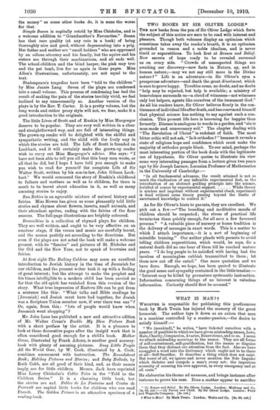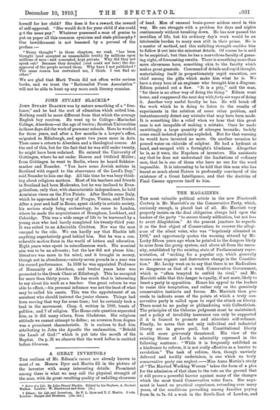WHAT IS MAN ? t
WHOEVER is responsible for publishing this posthumous book by Mark Twain has injured the memory of the great humorist. The author lays it down as an axiom that man is a machine controlled by a master-passion,—the desire to satisfy himself :— " We (mankind)," he writes, " have ticketed ourselves with a number of qualities to which we have given misleading names, Love, Hate, Charity, Compassion, Avarice, Benevolence, and so on. I mean we attach misleading meanings to the names. They are all forms of self-contentment, self-gratification, but the names so disguise them that they distract our attention from the fact. Also we have smuggled a word into the dictionary which ought not to be there at all—Self-Sacrifice. It describes a thing which does not exist. But worst of all, we ignore and never mention the Sole Impulse which dictates and compels a man's every act: the imperious necessity of securing his own approval, in every emergency and at all costs."
He elaborates his theme ad nauseam, and brings instance after instance to prove his case. Does a mother appear to sacrifice • (1) Beason and Belief. By Sir Oliver Lodge. London: Methuen and Co. [Se. 6d. net.1—(2) Parent and Child. By Sir Oliver Lodge. London: Funk and Wagnalle Company. [2s. net.]
t What is Man? By Mark Twain. London: Watts and Co. [Se. Od. net.]
herself for her child? She does it for a reward, the reward of self-approval. "She would do it for your child if she could get the same pay." Whatever possessed a man of genius to put on paper all this common cynicism and stale philosophy Our bewilderment is not lessened by a perusal of the preface :—
" Every thought in those chapters, we read, " has been thought (and accepted as unassailable truth) by millions upon millions of men—and concealed, kept private. Why did they not speak out? Because they dreaded (and could not bear) the dis- approval of the people around them. Why have I not published ? The same reason has restrained me, I think. I can find no other."
We are glad that Mark Twain did not often write serious books, and we trust the "Rationalist Press Association" will not be able to hunt up any more such literary remains.



























































 Previous page
Previous page